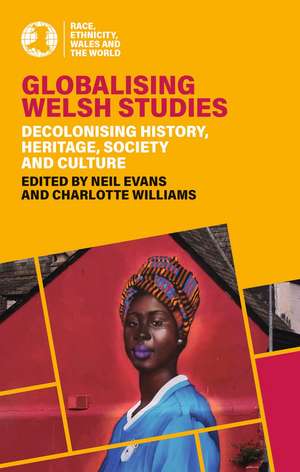Globalising Welsh Studies: Decolonising History, Heritage, Society and Culture: Race, Ethnicity, Wales and the World
Editat de Neil Evans, Charlotte Williamsen Limba Engleză Paperback – 24 ian 2025
Globalising Welsh Studies is the first offering in the University of Wales Press’s new series Race, Ethnicity, Wales and the World. This introductory edited text provides a theoretical and conceptual basis for the series, engaging with the key perspectives and concepts that underpin the theme of the series and acting to cohere and consolidate race and ethnicity within Welsh studies.
Preț: 192.84 lei
Nou
Puncte Express: 289
Preț estimativ în valută:
36.90€ • 38.53$ • 30.47£
36.90€ • 38.53$ • 30.47£
Carte disponibilă
Livrare economică 25 martie-08 aprilie
Livrare express 08-14 martie pentru 26.37 lei
Preluare comenzi: 021 569.72.76
Specificații
ISBN-13: 9781837721863
ISBN-10: 1837721866
Pagini: 336
Ilustrații: 13 halftones
Dimensiuni: 218 x 216 x 23 mm
Greutate: 0.43 kg
Editura: University of Wales Press
Colecția University of Wales Press
Seria Race, Ethnicity, Wales and the World
ISBN-10: 1837721866
Pagini: 336
Ilustrații: 13 halftones
Dimensiuni: 218 x 216 x 23 mm
Greutate: 0.43 kg
Editura: University of Wales Press
Colecția University of Wales Press
Seria Race, Ethnicity, Wales and the World
Notă biografică
Neil Evans is an honorary research fellow at Cardiff and Bangor Universities in Wales. Charlotte Williams is professor emerita at Bangor University.
Cuprins
Editorial – ‘Globalising Welsh Studies’
Charlotte Williams and Neil Evans
Introductory Essay: A ‘Microcosmopolitanism’ of Wales
Dylan moore
Part One: Re-examining History And Heritage
Chapter 1 A deliberately Forgotten History? Wales and Imperialism in Modern History Writing
Rhys Owens
Chapter 2 John Ystumllyn or Jack Black: The Chronicle of Alltud Eifion Gareth Evans Jones
Chapter 3 The East India Company in Wales: Colonial Connections in the Country House, 1760-1820
Eleanor Stephenson
Chapter 4 Caribbean and West African seamen in a Welsh Port, 1891-1939: The Seamen’s Boarding house, Migration and Settlement
Joe Radcliffe
Part Two: Decolonising the Archive
Chapter 5 Race, ethnicity and public commemoration
Peter Wakelin and Judith Alfrey
Chapter 6 Museums in Wales: Legacy and Change
Marion Gwyn
Chapter 7. Phillips Must Fall: Histories and Legacies of Slavery and Colonialism at St David’s College, Lampeter
Alexander Scott
Part Three: Social And Cultural Change
Chapter 8. Very Black and Very Welsh: Race, National Identity and Welsh Writers of Colour in Post Devolution Wales
Lisa Sheppard
Chapter 9. Black Welsh Cinema as Afro-futurist movement
Yvonne Connike
Chapter 10: ‘The First Condition of Freedom’
Neil Evans, Huw Williams and Emily Pemberton
Chapter 11: An anti-racist plan for Wales: Prospects and limits
Emmanuel Ogbonna
Recenzii
“Placing Wales in the world locates the nation—and understandings of the nation—within its broader, global interconnections. This remarkable volume draws attention to the place of Wales within the overseas colonial project and examines the legacies of those colonial connections back home. The range of excellent contributions address issues of labour migration, devolution, race equality, the challenges of heritage work, as well as the ongoing processes of social and cultural change within Wales. This is a superb opener for a series that will ground scholarly work on Wales in the context of its diverse histories and histories of diversity.”
“This original and important new book asks searching questions about the relationship between a small non-state people and the empire in which they live and to which they contribute. That relationship is examined in the light of attempts to decolonise our understanding of both past and present, and to develop fresh approaches to social, cultural, and political life. Taken together, the chapters in this book shed new light on historical encounters between Wales and the wider world and illuminate the complexities of how race inflects present-day heritage and culture and the power dynamics of racial positioning. This is an essential contribution to understanding modern Wales in its full diversity, and the editors are to be applauded for assembling a group of writers and their stimulating contributions to the field.”
“Setting out the global context of Welsh studies is an essential and important precursor to understanding Wales’s journey to become an inclusive and antiracist nation. This volume of essays sets out the journey in an instructive and insightful manner within a global framework. As a pioneering collection, it broadens the horizons of Welsh Studies by linking local histories with transnational dynamics, and by reshaping our perceptions of Wales through the lenses of race, nationality and ethnicity. It offers an innovative approach, bridging disciplines and pushing the boundaries of scholarship on Wales’s diverse heritage and its rightful place as a trailblazing nation on inclusion worldwide. Within series, the volume is an excellent introduction to the redefining of Welsh identity by exploring its diverse and multicultural heritage, amplifying the narrative about the concept of belonging. It is a must read for anyone who seeks to understand our journey to inclusion and integration here in Wales.”


